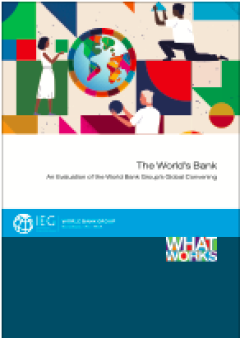
The World’s Bank: An Evaluation of the World Bank Group’s Global Convening
This first-of-its-kind evaluation assesses the scope of the World Bank Group’s convening on major global development challenges, and how effectively it is deployed. The report finds that the Bank Group’s comparative advantages give it strong convening power that it uses on many development issues. In so doing, it meets the demands of shareholders and stays highly relevant as a global actor often making strong and relevant convening contributions. There are many examples of effective Bank Group convening efforts, such as the Scaling up Nutrition initiative, the Consultative Group for International Agricultural Research, and initiatives in the areas of carbon finance, financial inclusion, development data, poverty measurement, river blindness, and several other global heath partnerships. The evaluation finds that the Bank Group is more likely to be effective when the external context is favorable, the Bank Group’s internal capacities are strong, when initiatives have clear objectives and are put into effect in country programs, and when engagement is sustained over time. The Bank Group has room to become a more effective convener by more selectively scoping its convening contributions, improving processes to manage convening initiatives over their lifecycle, and by more closely aligning convening initiatives with country programs.
